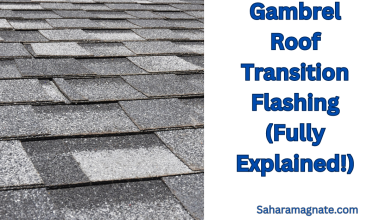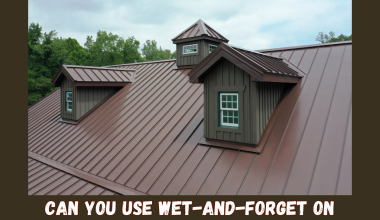There’s no denying it—owning a home is a big responsibility. It’s up to you to ensure your house is in top condition, especially regarding repairs.
Before doing that, you must decide which repair project should be tackled first: foundation or roof.
This isn’t an easy decision, and it isn’t something you can just eyeball. After all, your foundation and roof are two of your home’s most essential components, and overlooking either could lead to costly (and dangerous) consequences.
But don’t worry—we have the answer! We’ll guide you through some essential considerations to help you make an informed decision.
So kick back, relax, and let us help you figure out which house repair program should be fixed first: foundation or roof?
Should You Fix the Foundation or Roof First?
Are you remodeling your house but unsure which repair project to tackle first? It all depends on the condition of your foundation and roof.
If you notice any signs of a damaged foundation—like cracks in walls or floors or furniture beginning to show tilt—these issues must be addressed first.
Giving attention to your foundation will ensure that any other improvements you make continue to stand the test of time.
On the other hand, if your roof appears more worn out than your foundation, this should be taken care of first.
While a short-term fix may do the trick initially, replacing the entire roof is best rather than engaging in continual patchwork repairs over time.
Insufficient or outdated insulation can also be cause for concern and should be reversed for the overall good of your home.
Whether you take on foundational repairs or roof replacements first, ensuring these issues are addressed correctly is essential for a successful home remodeling journey.
Comparing Roof and Foundation Conditions
When assessing which repair program should take priority, you must consider the conditions of your roof and foundation.
Foundations typically exhibit signs such as cracked walls, loose tiles, and mold growth, while roofs often show rot or water leaks due to age or a broken shingle.
Repairing your roof could prevent further damage, such as water leakage that can lead to mold growth in the attic.
But if the foundation is more severe than your roof, such as visible cracks or a tipping chimney, you’ll want to fix this issue first.
It’s best practice to compare the conditions of your roof and foundation before deciding which one needs repairing first based on severity.
If you can’t make an assessment, consult a professional who can advise you on which area to prioritize.
What Are Warning Signs of Roof Damage?
When deciding which house repair project to tackle first, you need to look at the signs of damage and what specifically needs fixing. If your roof is damaged, how exactly can you tell?
Here are a few warning signs that should alert you:
- Shingles: If you see shingles on your driveway or lawn after a storm, that’s a sign that your roof has been damaged. Additionally, if your shingles are cracked or missing—even if the damage is from normal wear and tear over time—that can indicate a problem.
- Missing Granules: Another sign of damage is missing granules from the shingles. This can be caused by severe weather conditions or age, but it’s worth examining further to determine the cause and severity of the issue.
- Leaks: If your roof is leaking (or you’ve spotted water spots on walls or ceiling), this can be a sign of severe damage with which to contend. It’s important to address roof damage quickly, as leaks can cause water damage and lead to mold growth in no time.
Any combination of these signs should signal it’s time for repair—or worse yet, replacement—of your roof before tackling any foundation repairs that may be necessary.
What Are Warning Signs of Foundation Damage?
You might be wondering if you should focus on the foundation or roof—or worse, it might not be clear what to do, and you’re stuck.
To help you determine which area needs your attention first, let’s start with warning signs of foundation damage.
Uneven floors
Uneven floors are a big sign of foundation trouble. If a floor isn’t level, something is wrong with the home’s supporting system. It’s especially suspicious if your home has hardwood floors, which rarely become uneven.
Wall cracks
Look for visible cracks in walls near door frames and windows—if these exist, it could mean there’s an issue with the home’s support structure.
When the foundation shifts due to soil movement, settling, or other factors, it can cause stress, leading to telltale lines in walls and ceilings.
But there are other signs of foundation damage, too—if you’ve noticed any of the following around your house:
- Doors and windows that stick when opened or closed
- Stair-step cracks in exterior brickwork
- Visible separation between walls and ceilings or floors
- Gaps between trim work like crown molding and flooring
- Tilting chimneys
Then it might be time to call an expert to inspect your foundations.
Benefits and Drawbacks to Fixing the Roof First
You may wonder whether you should fix the foundation or the roof in-house repairs first. Both have pros and cons, but here are some things you must consider when fixing the roof first.
Benefits
The biggest benefit of fixing the roof first is that you can protect your home from outside elements like rain and snow, which can cause further damage to your foundation if left unchecked.
Another benefit is saving money in the long run because repairing a roof is typically cheaper than repairing a foundation.
Additionally, it will help keep energy costs down by making your home more efficient in retaining heat and other energy sources.
Drawbacks
One disadvantage of fixing the roof first is that it doesn’t address any potential structural issues with your home, so if there are underlying problems with the structure of your home, they won’t be addressed until you fix the foundation. This could mean more time and money on repairs down the line.
Additionally, depending on the damage to your roof, patching it up may not be an option — only replacing it would do — which may require a more lengthy process than simply fixing a foundation issue.
Before deciding which repair program should come first: roof or foundation, consider both benefits and drawbacks carefully.
Do some research into what needs fixing and what materials are needed for each job so that you can make an informed decision about which one comes first for your house repairs.
Benefits and Drawbacks to Fixing the Foundation First
Should you prioritize fixing your house’s foundation or roof first? It’s essential to consider both the benefits and drawbacks of each option before making a final decision.
Benefits of Fixing the Foundation First
Regarding which repair project to take on, fixing your foundation is one option.
The primary benefit of this approach is that it can help protect against further damage to your home and could even improve the home’s value if you decide to sell it in the future.
Drawbacks of Fixing The Foundation First
Fixing your foundation isn’t all roses—it can be expensive compared to other repairs, and it can also be disruptive if you are living in your home while construction is underway.
Ultimately, when assessing which repair program should come first, foundation or roof—it’s essential to consider all the possible benefits and drawbacks associated with each project.
By weighing these factors carefully, you can determine which project makes the most sense for you and your home.
Conclusion
When choosing between repairing your house’s foundation or roof, you should consider factors such as your budget, geographical location, and urgency of repairs.
If your area is prone to heavy rain and flooding, it is best to prioritize repairing the foundation.
On the other hand, if your area is prone to strong winds and storms, you should prioritize roof repair.
Additionally, the repair of either one of these components will likely be costly. If your budget is tight, seek help from government programs or other sources. In any case, it is wise to consult a professional to make the right choice.






